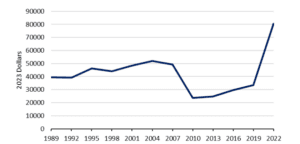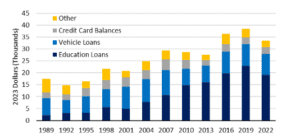Young Americans Are Wealthier Than Ever—So Why So Fragile?
Americans under 40 are sitting on unprecedented levels of wealth, but many still feel the weight of economic insecurity. A recent report from the US Treasury Department highlights this paradox, shedding light on the complex interplay of rising assets, mounting debt, and shifting societal norms.
Median wealth for Americans aged 25 to 29 surged to over $80,000 in 2022, a more than $50,000 increase from 2010. This dramatic rise, marked by gains across education, income, and racial groups, signals a recovery from years of stagnation following the 2008 financial crisis.
Real Median Wealth: Age 25-39

Yet alongside this wealth boom, debt has ballooned. Since 1989, student loan debt has grown nine-fold, fueled by rising college attendance and skyrocketing tuition costs.
Despite increasing wealth, younger Americans face persistent challenges. Rising housing and childcare costs have outpaced wage growth, leaving many struggling to keep up.
Median real earnings for young men with some college or high school education have stagnated or declined since 1990, while earnings for women with bachelor’s degrees have risen sharply, narrowing the gender wage gap but highlighting broader inequities.
Housing costs are a particular flashpoint. Median home prices, adjusted for inflation, have nearly doubled since 1990, with rents also climbing steeply.
More than 90% of Americans now live in counties where housing costs have risen faster than incomes over the past two decades. Combined with the weight of non-housing debt, these dynamics have left younger Americans more likely to live with their parents and less likely to marry or have children compared to their parents’ generation.

This sense of economic fragility is not solely financial. The Treasury report points to a growing unease rooted in broader societal trends.
Rising obesity rates, increasing social isolation, and higher mortality rates linked to external causes such as overdoses and suicides reflect a decline in physical and mental health among young adults.
Environmental and fiscal challenges add to the uncertainty. Concerns about the long-term effects of climate change and unsustainable federal debt loom large, with the former threatening livelihoods through worsening weather events and the latter casting doubt on the future of retirement benefits.
While these issues are not yet top of mind for many younger Americans, the Treasury warns they could become significant drags on economic confidence in the years ahead.
The Treasury Department argues that attempts to recreate the economic conditions of the 1990s would be counterproductive, as they would erase hard-won gains in wealth, education, and gender equity.
Instead, the report calls for tailored solutions to meet the unique challenges of today’s economy. Expanding access to affordable housing, childcare, healthcare, and vocational training could ease financial pressures and foster greater economic security.
The findings suggest that while wealth is a critical measure of progress, it does not tell the whole story. Rising debt, stagnant wages for some, and structural pressures from an aging population are reshaping what it means to be economically secure.
Addressing these challenges will require a rethinking of how policies are designed to meet the needs of younger generations.
Leave a Reply